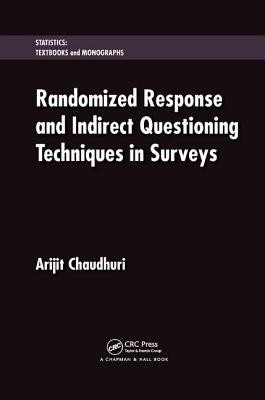
- We will send in 10–14 business days.
- Author: Arijit Chaudhuri
- Publisher: CRC Press
- ISBN-10: 1138115428
- ISBN-13: 9781138115422
- Format: 15.6 x 23.4 x 1.2 cm, softcover
- Language: English
- SAVE -10% with code: EXTRA
Randomized Response and Indirect Questioning Techniques in Surveys (e-book) (used book) | bookbook.eu
Reviews
Description
For surveys involving sensitive questions, randomized response techniques (RRTs) and other indirect questions are helpful in obtaining survey responses while maintaining the privacy of the respondents. Written by one of the leading experts in the world on RR, Randomized Response and Indirect Questioning Techniques in Surveys describes the current state of RR as well as emerging developments in the field. The author also explains how to extend RR to situations employing unequal probability sampling.
While the theory of RR has grown phenomenally, the area has not kept pace in practice. Covering both theory and practice, the book first discusses replacing a direct response (DR) with an RR in a simple random sample with replacement (SRSWR). It then emphasizes how the application of RRTs in the estimation of attribute or quantitative features is valid for selecting respondents in a general manner. The author examines different ways to treat maximum likelihood estimation; covers optional RR devices, which provide alternatives to compulsory randomized response theory; and presents RR techniques that encompass quantitative variables, including those related to stigmatizing characteristics. He also gives his viewpoint on alternative RR techniques, including the item count technique, nominative technique, and three-card method.
EXTRA 10 % discount with code: EXTRA
The promotion ends in 16d.22:28:26
The discount code is valid when purchasing from 10 €. Discounts do not stack.
- Author: Arijit Chaudhuri
- Publisher: CRC Press
- ISBN-10: 1138115428
- ISBN-13: 9781138115422
- Format: 15.6 x 23.4 x 1.2 cm, softcover
- Language: English English
For surveys involving sensitive questions, randomized response techniques (RRTs) and other indirect questions are helpful in obtaining survey responses while maintaining the privacy of the respondents. Written by one of the leading experts in the world on RR, Randomized Response and Indirect Questioning Techniques in Surveys describes the current state of RR as well as emerging developments in the field. The author also explains how to extend RR to situations employing unequal probability sampling.
While the theory of RR has grown phenomenally, the area has not kept pace in practice. Covering both theory and practice, the book first discusses replacing a direct response (DR) with an RR in a simple random sample with replacement (SRSWR). It then emphasizes how the application of RRTs in the estimation of attribute or quantitative features is valid for selecting respondents in a general manner. The author examines different ways to treat maximum likelihood estimation; covers optional RR devices, which provide alternatives to compulsory randomized response theory; and presents RR techniques that encompass quantitative variables, including those related to stigmatizing characteristics. He also gives his viewpoint on alternative RR techniques, including the item count technique, nominative technique, and three-card method.


Reviews